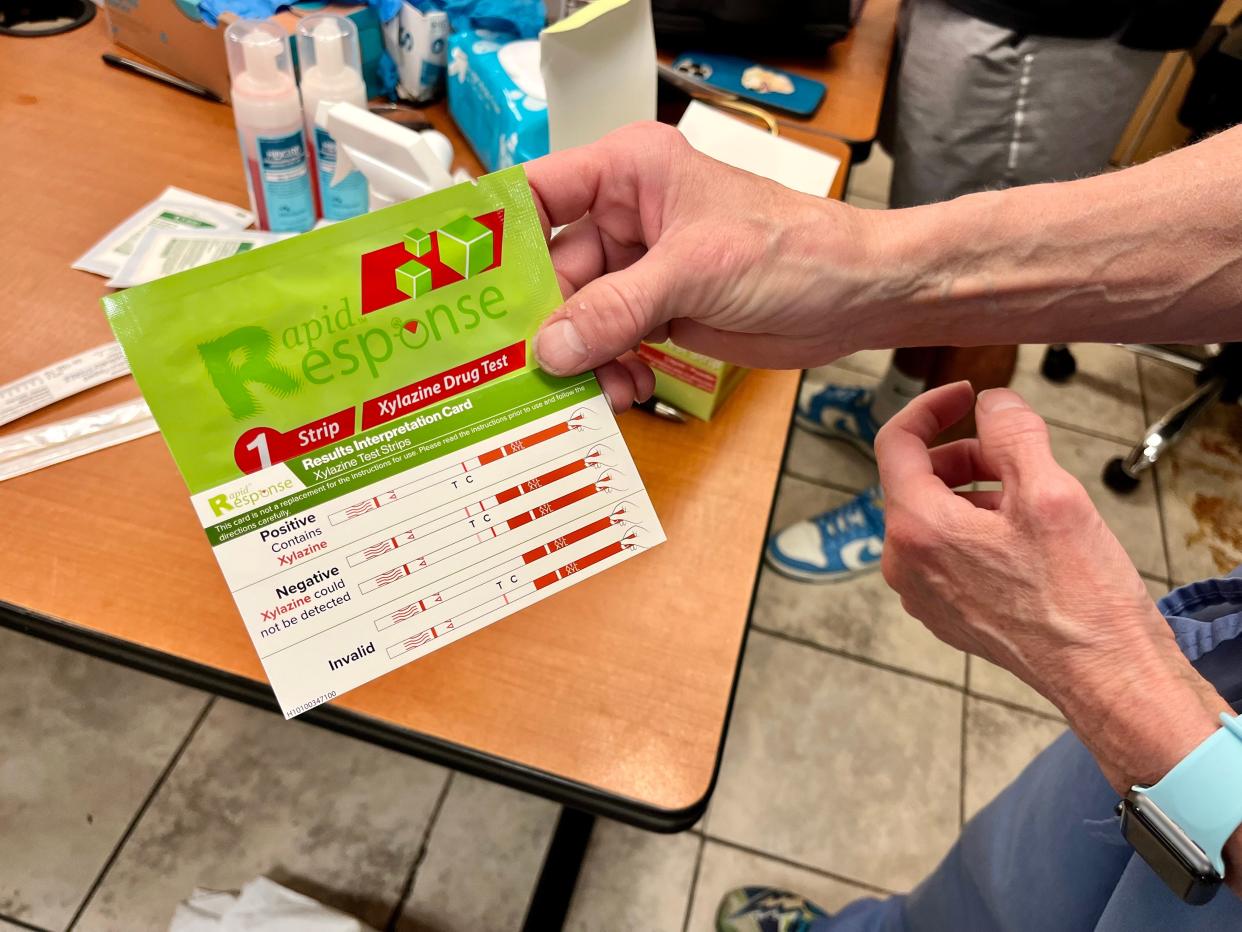Here's what Kansans must know about emerging drug xylazine and its connection to fentanyl

Kansas is entering a new front in its battle to combat opioid overdoses, a fight made more difficult by the proliferation of fentanyl, the synthetic opioid that is increasingly monopolizing drug use fatalities in the state.
But a new drug has increasingly emerged nationally and in Kansas that could upend halting progress towards reversing the trend of drug overdoses: xylazine.
States across the country have seen a rash of cases where individuals will mix the powerful sedative with fentanyl, prompting a new set of public health risks and a declaration from President Joe Biden's administration that the drug is an "emerging threat" facing the United States.
While Kansas hasn't seen the impact that several eastern and midwestern states have felt, the drug has begun to crop up in the state and is on the radar of public health officials, activists and law enforcement.
"It is here. We know that," said Lisa Vayda, a Wichita pharmacist and harm reduction advocate. "It is in the drug supply."
What is xylazine?
Xylazine is a potent sedative, generally used by veterinarians for larger animals, such as horses or cattle. Despite this, it isn't approved by the Food and Drug Administration for use by humans.
Also known as "tranq," xylazine is increasingly being added to fentanyl as a way of prolonging and intensifying the high from that drug. It has been part of the drug supply in Puerto Rico and other areas for some years, but its prevalence has risen in recent years. The U.S. Drug Enforcement Agency found in 2022 that a little under a quarter of all fentanyl seized in 48 states contained xylazine.
A separate DEA intelligence report that xylazine-laced fentanyl was responsible for 351 overdose deaths in the Midwest in 2021. While that number may sound relatively minor, that marks a more than 500% increase from the year before and the increase was even more pronounced in other regions in the United States.
Is xylazine in Kansas?
By all accounts, xylazine has been reported in the drug supply in the state's largest urban areas of Wichita and Kansas City.
The Regional Forensic Science Center in Sedgwick County estimated it began seeing the drug about a year-and-a-half ago but didn't begin tracking or reporting data on it until July of last year after the Federal Bureau of Investigation labeled it as a potential threat.
The center reported 104 tests for xylazine stemming from four cases in 2022.
A similar story has played out in Johnson County, where Jesse Valdez, a spokesperson for the Johnson County Sheriff's Department, said there have been 18 cases involving xylazine in 2023 alone.
"This is a serious problem," Valdez said. "It is a serious problem in Johnson County. It is a serious problem in the U.S."
Is xylazine in Topeka and Shawnee County?
The Shawnee County Sheriff's Department and Topeka Police Department said they are tracking the threat of fentanyl laced with xylazine but that there hasn't been any observed cases in the Topeka area to date.
Why has xylazine prompted public health concern?
Because xylazine isn't an opioid, it means the overdose death reversal drug Naloxone, or Narcan, isn't effective. That means that an individual who overdoses on xylazine couldn't be revived in the way that many other opioid-related overdoses are.
There is some concern that xylazine may make opioid withdrawals worse, as well as make it more difficult to start individuals on medication assisted treatment to help manage and treat substance abuse.
And wounds and lesions from using the drug can be ghastly, due to a decrease in oxygen flowing to the skin, and can be difficult to treat.
What can Kansas do about xylazine?
As xylazine has become increasingly prevalent nationally, lawmakers have pushed to schedule the drug as a controlled substance, which would more easily allow prosecutors to criminally charge those who distribute it, as well as heighten record-keeping requirements and increase the safeguards needed when storing xylazine.
While a bipartisan coalition of lawmakers federally have expressed an interest in the idea, it also has raised concerns that limits on xylazine could dissuade veterinarians from using the drug. Some states, not content on waiting for Congress, have deemed the drug to be a controlled substance, including Pennsylvania and Ohio.
In Kansas, such a move is the domain of the Legislature, which recently adjourned for 2023, meaning any changes to the status of xylazine won't be considered until next year.
Rep. Stephen Owens, R-Hesston, chair of the House Corrections and Juvenile Justice Committee, said the issue of prosecutions was likely a nonissue. Because most xylazine is cut into fentanyl, an individual would still be able to be charged with distributing a controlled substance.
But listing xylazine was something Owens said was worth reviewing, though he said a more thorough review was needed on whether the drug was being diverted from veterinarians or arriving already mixed with fentanyl.
"I think we've got to really dig into the issue and identify where it is coming from, how is it being manufactured and holding everyone accountable in that process," he said.
Test strips do exist to identify xylazine, much like the fentanyl test strips decriminalized by the Legislature in 2023, though they cost much more than their fentanyl counterparts.
Yet the fact that its rise comes as lawmakers decriminalized the strips and passed increased penalties for fentanyl possession was alarming, Owens said, as it would appear to peg back officials in their bid to wrap their arms around the opioid problem.
"That scares me to death," he said. "It scares me to think that we have another drug being introduced in the market that we really don't have any effective treatment for."
This article originally appeared on Topeka Capital-Journal: Kansas fentanyl, xylazine problems worsen as officials weigh response

